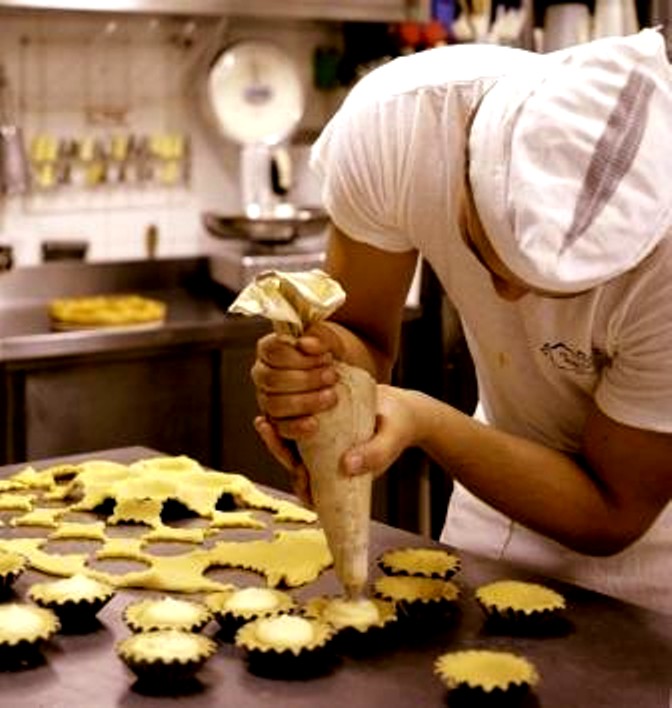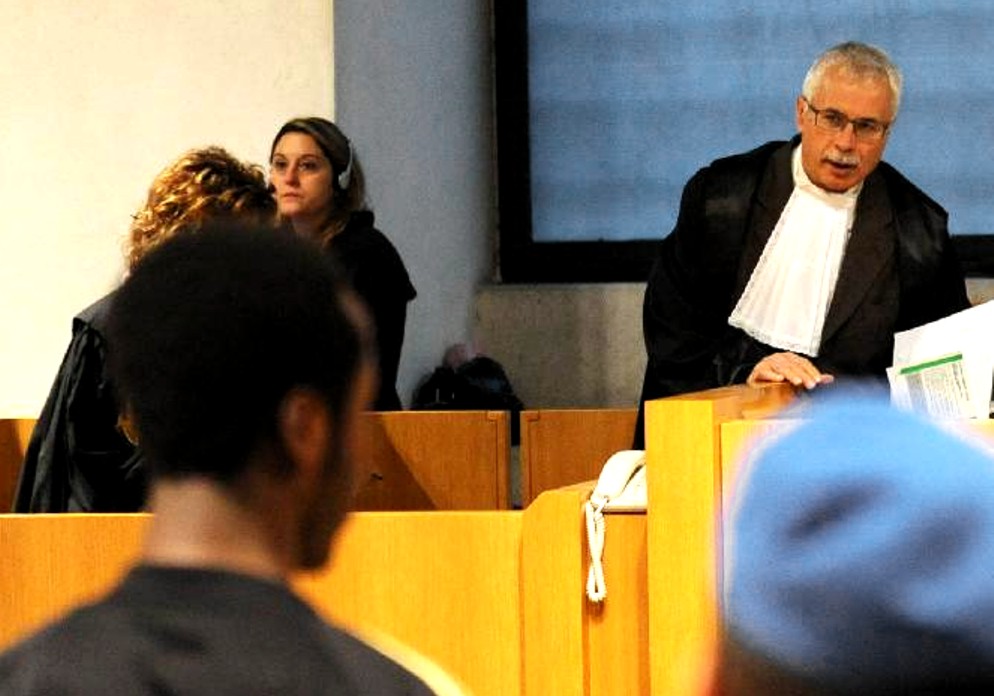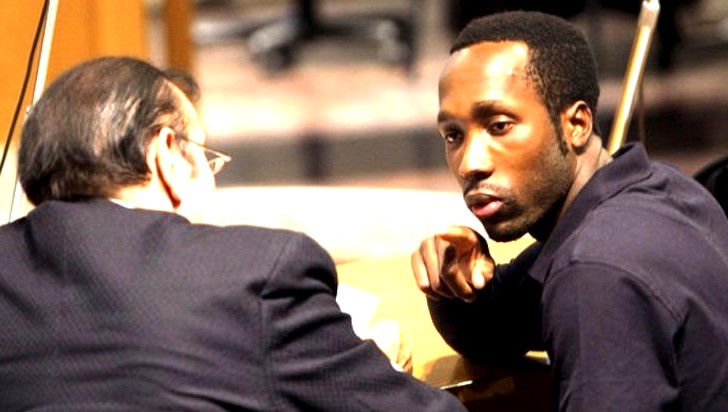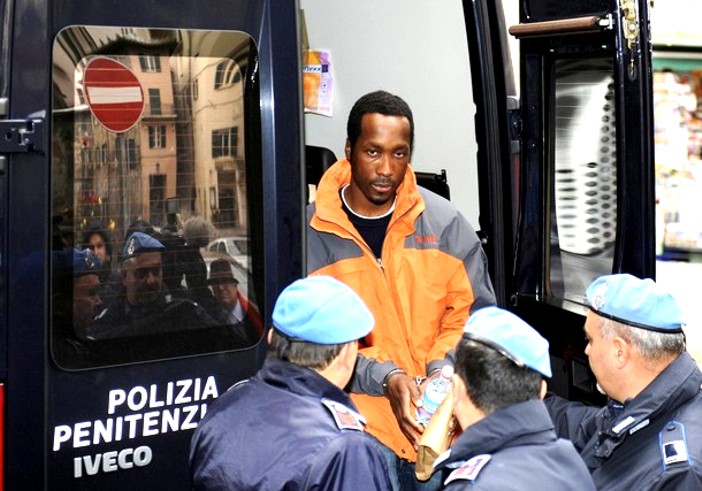
Friday, January 15, 2010
Knox PR Puppet Timothy Egan Gets A Splash Of Cold Water From A Respected Trial Lawyer
Posted by Peter Quennell
Seattle and Spokane are at opposite ends of Washington State.
Spokane is the second largest city in the state, some 280 miles to the east of Seattle, and it is nicely located and landscaped. These spectacular falls are just one block away from the downtown.
As our Seattle posters have been showing, a majority in Seattle seem to be settling now on some hometruths, such as that justice for Meredith has actually been rendered.
The “Knox framed by evil Italians” meme is looking like an imperiled species even there, where the PR campaign did its absolute darndest with the help of a large handful of Knox PR puppets.
Spokane seems to have brushed off the PR campaign almost entirely, and it has never ever seen a strong “framed” constituency emerge.
Now a highly respected Spokane lawyer, Bill Edelblute, takes on the many ill-informed claims of Seattle-based blogger Timothy Egan - claims which among others may have swayed Senator Maria Cantwell.
Unlike many of the absurdists who posted once and then clearly felt, well, absurd, Timothy Egan posted several times, increasingly strained and defensively. How his contemptuous attitude toward Italy paid off was described in our posts here and here and here.
Mr Edelblute posts eleven reality checks in response to Egan’s various claims. His article starts as follows - questioning the attempt to make Maria Cantwell, Hillary Clinton and even Barack Obama into the ultimate Knox PR puppets for the cause.
U.S. Senator Maria Cantwell, D-WA, was “saddened” by the verdict convicting Amanda Knox of the murder of Meredith Kercher. Her spokesman later issued another statement about the lack of a fair trial in Italy, and Cantwell appeared on television reiterating that the proceeding was unfair. And, she was going to enlist Hillary Clinton, apparently believing fair legal proceedings mean outside influence is exercised by non-judicial authorities.
Why does an elected official in high office like Cantwell believe this, what is she going on? One of the often cited sources for the “railroad” job are the articles by Tim Egan, a best-selling author living in Seattle, who did not attend the trial. Is it this type of American journalism that Cantwell has swallowed, hook, line and sinker?
The proliferation of writers who casually attack the Italian justice system, and its treatment of the Kercher murder case, such as Tim Egan, also focus on the supposedly unfair press in Europe. Imitation must be the sincerest form of flattery. Egan’s articles attack the Italian news treatment of the case as being factually inaccurate and sensational. Where did they learn it, from the U.S.? Witness the O.J. Simpson case, etc. Ever watch the Nancy Grace show? Are the supermarket tabloids in the U.S. imported from Italy?
Egan is loose with the facts, and makes assumptions about an entire populace with no need for the tedious obligation to back it up with any logic or truth
Mr Egan of course is not a lawyer, and Mr Edelblute of course actually is. Here is Mr Edelblute’s entire article. It is well worth reading in full.
Please click here for more
Thursday, January 14, 2010
With Not Many Prisons And Forecast Overcrowding Italy Decides To Build A Few More
Posted by Peter Quennell
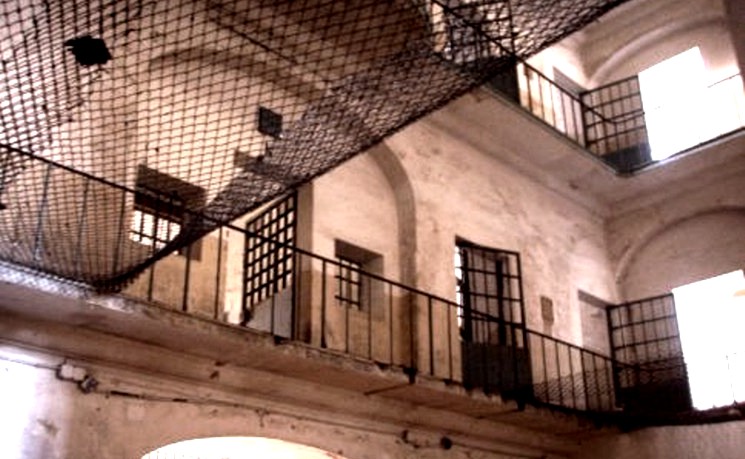
[Above: Viterbo Prison where Guede is in the sex offenders’ wing]
Looks like bad news for the three convicted of murdering Meredith.
Their chances of early release if they fail to win release on appeal may now become much less. First the context, from Commissario Montalbano
Given these facts, coupled with the chronic lack of prison space, it shouldn’t be a surprise that in spite of the Cosa Nostra, the Camorra and N’drangheta (as the mafia is called in the various regions), Italy has maybe the absolute lowest prison population in the world in relationship to the total population.
Italy in fact has 66 inmates for every 100,000 population, a figure matched only by Denmark, a country certainly not famous for their organized crime. By comparison, the US boasts a prison population of more than 750 inmates for every 100,000, over 1 million inhabitants, a figure 12 times the one in Italy.
Now ANSA is reporting a declaration of a state of emergency in the prison system, and the round-the-clock building of new cells to contain about 37,000 new beds.
Alfano announced that first on the agenda was the construction of 47 new jail annexes to boost the system’s capacity by 21,749 units.
The new cell blocks would cost a total 600 million euros and follow the rebuilding strategy implemented in the earthquake-struck city of L’Aquila, with construction crews working in round-the-clock shifts.
“This is the same scheme that has allowed us to put a roof over the head of everyone who lost their home” in the April 2009 quake, Alfano said.
In addition, between 2011 and 2012 the government would launch a second campaign to build brand-new prisons to accommodate a total of 80,000 inmates, almost twice its current capacity.
To depressurize jails in the meantime, the justice minister promised new legislation allowing home detention for inmates with less than one year to serve on their sentence and probation with community service for anyone sentenced to less than three.
Finally, he promised to hire some 2,000 new guards needed to oversee Italy’s swelling prison population, which hit a post-war high last year of over 65,000 detainees.
Italy’s aging jails, most of which built in the 19th century, were designed to accommodate just 43,000 prisoners.
Experts have blamed the overcrowding for a record 71 prison suicides in 2009 and another four in the first week of January.
Below, Viterbo Prison again. All prisoners in Italy are required to learn a useful trade. No info yet on what the three convicted of Meredith’s murder are learning, though there seems plenty of lead-time.
We presume that sooner or later, for their own protection like Guede already, Sollecito and Knox will end up in sex offenders’ wings.
Friday, January 08, 2010
A Month Has Passed And Senator Cantwell Still Hasn’t Answered Constituents’ Hard Questions
Posted by Highly-Concerned Washington-State Voters
On December 9, 2009 five well-informed constituents of US Senator Marie Cantwell sent her an Open Letter.
It asked some questions about the reasoning behind her December 4th press release on the verdict in Meredith’s case.
The public release of this letter to Maria Cantwell garnered international attention, and it was quoted-from in various stories and reports published in Europe..
On December 10, a Cantwell Senate-office staff member in Washington DC, John Diamond, provided the one and only direct response to inquiries about it.
Mr Diamond claimed “Our staff has checked every possible in-box and not turned up the letter. We get lots of mail and email sent through to us every day, so I don’t know what the problem was. We now have your letter so it’s a mute point. We will get back to you.”
Rather bizarrely, on December 11th, Mr. Diamond then forwarded to the authors of the Open Letter a Knox/Mellas Family Press Release. It was issued by the paid Seattle PR man David Marriott, and Ms Cantwell’s office seemed to be endorsing it.
The release stated among other things, “We would like to publicly thank Senator Maria Cantwell for her support of Amanda, support of the family, and her continued work on our behalf.”
No other response has ever been received by the authors of that Open Letter, other than one auto-reply email from Mr. Diamond saying, “I will be out of the office through Labor Day.” (Labor Day is the first Monday in September, then a full nine months away.)
On December 15th the Seattle PI’s Andrea Vogt in her story “The debate continues over Knox’s guilt” reported that instead of repeating the harsh complaints of her press release, Cantwell’s spokesperson Katharine Lister was now saying this:
“Senator Cantwell believes that Amanda Knox deserved a fair trial, and now deserves a fair appeal by an impartial tribunal; all in keeping with the Council of Europe and the European Union’s treaties to which Italy has long been a signatory. While she certainly understands that the legal system and practice in Italy is different than in the U.S., she believes it is the responsibility of the U.S. government to press for fair treatment for any U.S. citizen facing legal jeopardy overseas. She will continue to press to ensure that Amanda gets a fair appeal, by an impartial tribunal.”
On December 24, 2009 the following new inquiry was sent to Senator Cantwell, reiterating the concerns of the original letter and a desire for a response from Senator Cantwell, and repeating the request to meet with Senator Cantwell herself or a senior member of her staff.
To this letter Senator Cantwell’s Seattle area constituents are still awaiting her reply more than two weeks later.
Dear Senator Cantwell:
Last December we submitted an Open Letter and had some contact with John Diamond regarding your press release concerning the Amanda Knox guilty verdict in Italy for the murder of Meredith Kercher. We have yet to receive a response other than an email from Mr. Diamond simply forwarding a press release from the Knox/Mellas Family. Five of your Seattle area constituents authored that Open Letter to question the reasoning behind statements made in your press release.
We did not feel as though we were well represented by that press release and are still awaiting a response to the issues we raised, including a request to meet with your Chief of Staff. Now that the holiday break is upon us I think it’s a great time to revisit these issues since we haven’t seen any additional press releases from your office and are left wondering if the situation has progressed or if you have adjusted your position on the issue of the Amanda Knox guilty verdict in light of ongoing events and news coverage.
As a recap, here are the key points from your press release and a few of our questions regarding the rationale behind your points:
1. “I have serious questions about the Italian justice system and whether anti-Americanism tainted this trial.”
If you are requesting a full briefing on the principles of Italian justice it seems that there are far better places to ask than in what might be construed as a xenophobic press release. To our eye, you seem to be suggesting that anti-Americanism in Italy is a serious ongoing problem and I am wondering what evidence you have to support this perception and, specifically, how it would apply to the Amanda Knox (American) and Raffaele Sollecito (Italian) murder trial.
2. “The prosecution did not present enough evidence for an impartial jury to conclude beyond a reasonable doubt that Ms. Knox was guilty.”
How can you justify making such a statement? You seem to be indicating here that you were following the case quite closely, but elsewhere you indicate that you weren’t. Do you state this as an opinion or as a fact? I am concerned because Curt Knox and Edda Mellas have been charged with defamation by the Italians for making similar unfounded accusations against the Italian justice system.
3.“Italian jurors were not sequestered and were allowed to view highly negative news coverage about Ms. Knox.”
What special knowledge do you have to make an informed critique of the Italian justice system? Our impression, having closely followed of the murder trial for Amanda Knox and Raffaele Sollecito, was that the jury behaved honorably and was somewhat restrained and lenient in issuing their ruling. We expect to find some justification for this impression in the lengthy and detailed summary of findings that the court will issue within 90 days of the ruling.
Regarding press coverage, our personal observation is that the media battle waged by the Knox family and David Marriott was, in fact, very effective in highlighting the concerns of the Knox family in outlets around the world, to the extreme point that whatever Curt Knox and Edda Mellas have to say about the murder case is reported verbatim, without question or verification. We also believe that media coverage during the lengthy trial itself focused heavily on the prospect of an “innocent” Amanda Knox and the weaknesses in the prosecutor’s case.
4.“Other flaws in the Italian justice system on display in this case included the harsh treatment of Ms. Knox following her arrest; negligent handling of evidence by investigators; and pending charges of misconduct against one of the prosecutors stemming from another murder trial.”
What specific systemic flaws are you referring to here, and in comparison to what system? We’re wondering what your specific recommendations would be to the Italian Foreign Minister and where you will find the time to research and author them.
While we’ve seen the claims of harsh treatment and abuse in the media we are unable to verify any of these allegations. We have noticed, however, that Amanda Knox has been charged with and investigated for making false allegations, and convicted in the instance of accusations made against her former employer Patrick Lumumba. Can you clearly detail any specific incident of harsh treatment Amanda Knox received, either before or following her arrest?
Can you provide specific examples of the negligent handling of evidence that clearly compromised Amanda Knox’s right to a fair trial? We have followed this case closely from the beginning and while certain investigative elements could have been better handled we are not aware of anything suggesting that the Italians are fundamentally incapable of properly documenting and evaluating a crime scene, or conducting a fully “fair trial” for that matter.
In addition, we would appreciate a detailed description of your understanding of the alleged charges against prosecutor Giuliano Mignini and the relevant connection you are trying to make between that legal proceeding and the Amanda Knox, Raffaele Sollecito murder trial.
In regards to Amanda Knox, Mignini was one of two prosecutors in a case that involved the coordination of a variety of completely separate entities in Italian law enforcement and legal systems. According to our understanding of Italian legal processes, the charge against Mignini relating to the other murder trial case seems somewhat routine, rather insignificant, and could very well be dismissed later this month.
5.“I will be conveying my concerns to Secretary of State Hillary Clinton.”
What was Secretary Clinton’s response to you? It has been our understanding that the US State Department and US Embassy in Rome have been following this case from the beginning, have visited Amanda Knox in prison, and have attended court sessions.
We’re wondering what compelled you to insert yourself so publicly into an international situation when your press release gives the strong indication that you were not fully briefed before issuing it and appear to know very little about what has actually been going on with the case.
In the sole interest of providing you with our valid and informed perspective, we remain very interested in meeting with you and/or your Chief of Staff to discuss these issues in detail and share the facts as we understand them. As your concerned constituents, please us know if this will soon be possible.
[signed by five constituents in the original]
Thursday, January 07, 2010
The False Accusation By Amanda Knox Against Patrick Lumumba
Posted by The Machine
This incisive video by our main poster ViaDellaPergola explores Amanda Knox’s accusations against Patrick Lumumba - made even though she knew very well he had then been at his bar.
These accusations resulted in Patrick’s arrest and imprisonment on the morning after the night that she first voiced them. Knox first made the claims as a WITNESS and so no lawyer was present, and so the statement was not entered into evidence.
But later on 6 November 2007 when she was in her prison cell as a SUSPECT she wrote her claims all out again. This purely voluntary written statement (alibi version 4) by definition puts her at the scene of the crime.
This written statement WAS entered into evidence - and not retracted or modified in any way until all believability had flown, and Patrick was already back home with his family.
In fact, it was not until she was on the stand on June 12 and 13 2009 that Amanda Knox came up with Alibi Version 5. This is the one never supported by Sollecito - where she claimed she was at his place all night. Amanda Knox STILL has no alibi that stands firm.
Knox is being prosecuted by the Republic of Italy, not by Lumumba, on a calunnia charge.
Explanation of
calunnia
The charge of calunnia (art. 368) has been commonly translated as “slander” in the English/US media. This translation is incorrect, however, as calunnia is a crime with no direct equivalent in the respective legal systems.
The equivalent of “criminal slander” is diffamazione, which is an attack on someone”Ÿs reputation. Calunnia is the crime of making false criminal accusations against someone whom the accuser knows to be innocent, or to simulate/fabricate false evidence, independently of the credibility/admissibility of the accusation or evidence.
The charges of calunnia and diffamazione are subject to very different jurisprudence. Diffamazione is public and explicit, and is a more minor offence, usually resulting in a fine and only prosecuted if the victim files a complaint, while calunnia can be secret or known only to the authorities. It may consist only of the simulation of clues, and is automatically prosecuted by the judiciary.
The crimes of calunnia and diffamazione are located in different sections of the criminal code: while diffamazione is in the chapter entitled “crimes against honour” in the section of the Code protecting personal liberties, calunnia is discussed in the chapter entitled “crimes against the administration of justice”, in a section that protects public powers.
Wednesday, January 06, 2010
American Lawyer Ted Simon Appointed To Help Out Italian Team On Appeal
Posted by Peter Quennell
A couple of US media websites and many in Italy are reporting that Theodore Simon is joining the Ghirga-Della Vedova defense team in Italy for Amanda Knox’s appeal.
The Press Association quotes him as follows.
Mr Simon said: “Amanda’s conviction stands as a tragic example of a wrongful conviction which requires meaningful review. “I look forward to working with Amanda and her family and with her Italian legal team, as we approach an appellate process that is designed, capable and empowered to ‘right this wrong’ which hopefully will result in her deserved release.”
Three points here.
First, Theodore Simon came across well in NBC’s excellent second Dateline report on Meredith’s case last year when he was then more neutral and even a tad pro-prosecution.
Mr Simon then predicted an uphill fight for the defense, and he explained the real danger of a whack-a-mole defense, where all the effort is put into trying to discredit a few straw-men elements when the body of the whole remains unshaken.
Second, the Ghirga-Della Vedova team never seem to have shown any appreciation for the “help” offered from the US which has seemingly turned many Italians off and possibly made their own task harder.
And third, Theodore Simon himself now seems to have moved sharply into his own whack-a-mole mode. When another prominent US defense lawyer attempted an intervention, we pointed out the real strength of the entire body of evidence.
John Q Kelly has been invisible on the case ever since.
Tuesday, January 05, 2010
The Vicious Destruction of Curt Knox, The Father
Posted by Danusunt
Picture Amanda Knox’s father, Curt Knox, as he nervously adjusted his posture when a cameraman snapped, “Sit up straight,” before Curt’s first appearance on global television.
He may have been in a corporate video or two in the past, perhaps some family videos. But this was big time. People behind and around the cameras weren’t smiling. The feeling of all business must have felt less than sympathetic.
Imagine how someone from make-up yanked hairs out of Curt’s nose, and how a snotty producer cut Curt off mid sentence to bark, “Try not to say, ‘Ummm’ so much.” In the background imagine someone saying, “Curt, that LA lawyer lady is on the phone again.”
Thrust into the spotlight, things escalate from embarrassing to overwhelming to Gloria Allred pretty quickly. But the image of Curt Knox squirming under the lights and in front of the cameras cannot be so nightmarish as what happened to Curt Knox next. Curt Knox, the father.
His reflex would come as it would to most fathers, to protect his little girl’s reputation; and, himself being a VP at Macy’s, perhaps a little bit of his own. As it would play out, by throwing himself into the fray, he was putting himself in the witness stand, and would either be deemed a reliable, or an unbelievable witness.
From the beginning, Curt Knox appeared a little disheveled as he laid out the boilerplate. ‘She just couldn’t do this. She doesn’t have it in her,’ he’d say.
He and his ex wife, a math teacher from West Seattle Vanity Fair writer Judy Bachrach found ‘perpetually baffled,’ would drone on and on about how perfect and innocent Amanda is. Then relatives, then friends, then friends of friends, and ultimately people pulled off Seattle streets, waxed poetically about the outgoing little girl who’s favorite piece of clothing was a slightly rusted My Little Pony chastity belt.
But imagine Curt’s face as he listened to someone tell him, “Amanda boned seven dudes, one of them at least on a train, and another, that Raffaele guy, a couple hours after she met him. And it’s gone public. It’s everywhere.”
Jesus. To hear that about his own daughter after sticking his neck out proclaiming she is as pure as snow that’s yet to hit the ground. How awful to learn you’ve been made a liar by your own flesh and blood, and that daddy’s little girl has been whoring around.
And with not even the chance to recover, there on video for the world to see was his little darling, fingering lacy panties in a trendy store, as that Raffaele guy told her, loud enough for others to hear, that the sex that night was sure to be pretty good. Some may recognize that as a common West Seattle girl’s need after a roommate’s murder. But most wont, least of whom, the Italians.
Curt was a VP at Macy’s, and held a position whereby honesty and integrity were key. Of course this didn’t look good for his daughter. But what about Curt? Curt the man? Curt the father? Curt the VP? Curt the guy who makes his living with a perceptive awareness of everything around him. What kind of impact did this have on his standing as a reliable character witness? How does a guy make eye contact after something like that?
I imagine Curt walking the halls of his office, wanting to yell at his fellow muckity mucks, “Your daughters are boning just like mine. Don’t kid yourself goddammit!”
But he stayed the course, again and again selling his daughter’s innocence into the camera, playing up her honesty, and perhaps playing the smart card in sticking to his own story. VPs don’t blink. Part of me admired him for that. But the majority recognized the great mistake he was making.
Now imagine Curt’s face as he listened to someone tell him, “Your daughter keeps telling different stories of where she was. She was at that Raffaele’s house smoking drugs. Or, no, she was at home, smoking drugs. She slept in late, no, she was at the store first thing buying cleaning supplies. No, she listened as a black man raped and murdered that girl, and fingered her boss as the guy. They arrested him . . . oh, they let him go. He’s going to sue for defamation. Now she says she was so high she can’t remember anything.”
To make matters worse, the nighttime tabloid shows found the story juicy enough to pour their hearts and wallets into, and it was everywhere in HD, starring the crazy lying tramp American girl with multiple stories and a myriad of personalities. And emerging as the man who knew her least was Curt Knox the father, who by now was clearly an unreliable witness.
The harder Curt Knox worked to proclaim his daughter’s innocence, the harder she worked to refute it. Curt and his ex wife said she got along great with her roommates. Truth was the roommates found her annoying, and dirty. Curt claimed she was loved by all, but many in Perugia called her troia, or bitch. The more they painted their daughter a victim, the more came out that they didn’t know their daughter at all - the exceptional Ugly American.
It bordered on perjury.
Curt and his ex wife claimed there was anti-American sentiment. And if there wasn’t, they were working hard to get it. Or somebody was. And they had lots if help, mostly from knee-jerk dirt hustlers at small Seattle stations, to the larger-than-lifes at the mega corps. That kind of help turned Amanda Knox the poor little confused victim, into Amanda Knox, the big screw you from all of here at USA dot com.
It didn’t take long for the wolf effect to happen. The louder they cried their faith in their daughter, the louder was Amanda’s response with shame, the louder and clearer appeared her guilt in an Italian court. It got to the point that if Curt Knox and his ex wife said one thing, the immediate opposite was looked forward to with great anticipation. And of course, Amanda delivered.
I imagine Curt Knox roaming the halls wanting to scream, “What are you looking at! You know what your daughters are doing at their dorms, don’t you! You know what your daughters are doing in their sororities! They’re drinking! They’re smoking! They’re FUCKING!” And I can’t blame him. I imagine him kicking and punching and throwing things through doorways and out windows. I imagine his rage to be unfathomable, the pain so far out of reach. And I for one would hold his hand through the worst of it, Amanda’s guilt and all.
It wasn’t surprising when Americans started whining about the state of Italian CSI. Specialists started cashing checks as on-camera experts on criminal investigations. They went so far as to point at grainy video and cry foul at how things were handled. Americans have grown so fond of the sexy edgy forensic crime dramas that these people had no problem feeding hysteria to the bloodthirsty masses that wanted lasers and massive glistening breasts and bulging slacks covering the scene as only Americans can do. No Horatio, no deal.
But Italians don’t see things the same way. I suspect the Italian prosecutors viewed the defense’s cry about DNA evidence as a stroke of good luck, and knew they’d won the case when America at large started chanting it. The louder the cry, the greater the insult to the Italian process. In reality Amanda had already hung herself with her mouth, but American pride continued to spit blood and snot into the face of Italian common sense. All of this was just gravy.
Maybe even Gloria Allred saw that and said, “Shit. She’s toast.” Maybe Curt should have taken her call.
At some point, someone somewhere made a different call, and suddenly the American media that had immediately smelled a shit-stinking rat in Amanda Knox, was now smelling and selling sweeter and more patriotic, if not nationalistic bunny farts. On every channel were gossip-level shows pandering to the American idiot that the Euro wolves had captured their purest stray lamb, and a team of the brave should go get her.
I kept waiting for Curt Knox to at least go silent on the advice of a qualified PR agent. Silent like the murder victim’s family. Silent like that Raffaele’s father, a prominent Italian doctor who for sure could have raised quite the stink in his own country if he felt there were foul play. But you’ll notice that Raffaele’s father, Curt Knox’s counterpart, was nowhere to be found in the American media.
But Curt and his ex wife kept whoopin’ it up like Slim Pickins at a chili cook-off that had run out of spoons. Many called it a coordinated media campaign, which included an impotent Larry King handing over the national stage to Curt and his ex wife to increase focus on that which, in the end, was doing more harm than good. Great for the ratings, bad for their daughter. It was as if some Hollywood screw was walking the two of them over every possible mine in the field just for giggles and grins.
CNN reported that Della Vedova, a member of Team Knox, reminded the jury of its obligation to church law, and to be “morally certain of their decision.” Again, probably another mistake, being that the majority of Amanda Knox’s transgressions had been of the moral nature. She had proven herself a liar, had bared false witness, and had clearly established herself a Jezebel. By continuously singing Amanda’s praises, Americans more so crucified her as they did come to her rescue.
There would be better judges to evoke than they of the Church. Perhaps Horatio Caine. But anyway, that’ll be 486,987 Hail Marys and 25 years in what is a pretty nice prison by any standards.
I imagine Curt Knox now, a burned-out tree trunk of a man sitting alone in his car in his VP parking spot. The wipers have stopped in the middle of the windshield and he stares at them with squinted eyes. He’s had the screaming matches with his ex wife over what she must have done to fuck up his daughter. He’s had the fights with the lawyers who couldn’t put a stop to it. He’s had the hugs and sobs with the foreign diplomats who really aren’t going to go to bat on this one. But deep inside, his anger rests on something he just can’t lash out at.
Amanda Knox had left home on Daddy’s dime no doubt, with a farewell to be remembered - “peace out suckers, loves Amanda.”
How does Curt Knox recover from something like that? Curt Knox the man. Curt Knox the father. Curt Knox, the sucker.
Thursday, December 31, 2009
The Driving Psychology In The Perugia Case: Could Those Just Convicted Be “Charming Psychopaths”?
Posted by Miss Represented
A Newish Psychological Concept
Those not yet familiar with the “charming psychopath” concept may be in for a surprise when they google the term.
It has been quite thoroughly explored in the past decade, in part with the hope of preventing future crimes.
Many thousands of relatives and friends of both victims and perpetrators have had their lives upended when one or other charming psychopath - probably part of a large pool - sheds any constraints, and a cool callous murder results.
The “charming” component leads easily to denial. There is quite a history of campaigns that set out to deny that any particular such murderer could actually have done it.
They simply seemed far too nice.
A widely read article by Robert D Hare on charming psychopaths in Psychology Today presented a precise description of the symptoms that should hint to the perceptive eye that something might be seriously wrong.
These are two highly-rated book-length treatments of the charming psychopath concept which have recently been selling well
- Without Conscience: The Disturbing World of the Psychopaths Among Us by Robert D Hare
- Snakes in Suits: When Psychopaths Go to Work by Paul Babiak and Robert D Hare
Psychologists well qualified in this field have now begun to float articles on the concept as it may apply to Raffaelle Sollecito and/or Amanda Knox, and some books will presumably follow.
Here is an article “Signs that suggest Amanda Knox is a psychopath” by an experienced American psychotherapist, Dr Coline Covington, who now practices in England.
She was the former Editor of the Journal of Analytical Psychology as well as the former Chair of the British Psychoanalytic Council, and she has also worked for the London police. In the article she describes Amanda’s behaviour in court:
Knox’s narcissistic pleasure at catching the eye of the media and her apparent nonchalant attitude during most of the proceedings show the signs of a psychopathic personality. Her behaviour is hauntingly reminiscent of Eichmann’s arrogance during his trial for war crimes in Jerusalem in 1961, and most recently of Karadzic’s preening before the International Criminal Court at the Hague.
The psychopath is someone who has no concern or empathy for others, no awareness of right and wrong, and who takes extreme pleasure in having power over others. The psychopath has no moral conscience and therefore does not experience guilt or remorse.
Most psychopaths are highly skilled at fooling those around them that they are normal by imitating the emotions that are expected of them in different circumstances. They are consummate at charming people and convincing them they are in the right. It is only when they reveal a discrepancy in their emotional response that they let slip that something may be wrong with them.
The psychopath is the conman, or in the case of Amanda Knox, the con-woman par excellence. Her nickname “Foxy Knoxy”, given to her as a young girl for her skills at football, takes on a new meaning.
Whether or not Knox, who is appealing her verdict, is ultimately found guilty, her chilling performance remains an indictment against her. Her family’s disbelief in the outcome of the trial can only be double-edged.
This is not the only time a suggestion has been made that Amanda has displayed behaviour which is often associated with psychopathy. It is a view that I myself have supported in the past.
And similar arguments have just been made by Professor David Wilson and Professor David Canter. Rather lurid headlines, but their science is sound.
On my companion website to TJMK on the psychological dimensions of the case, Miss Represented, there is some interesting discussion in the Comments on the arguments for charming psychopathia now being presented.
These articles are probably only the tip of the iceberg as more psychoanalysts get drawn to this case.
Wednesday, December 23, 2009
Rudy Guede Appeal: The Published Judgement Of The Court Of Appeal
Posted by Peter Quennell
The AGI News Service carried the full wording of the judgment which was published after the court session concluded.
Judges Giovanni Borsini (above) and Maria Rita Belardi presided over the appeal. There were no lay judges. The translation of the judgment below was kindly provided by our poster Tiziano.
The Court of the Assizes of Perugia at a hearing in chambers has published through a reading of the purview of the sentence the following judgement with reference to Articles 443, 605, 599 of the Code of Penal Procedure,
In partial emendation of the judgement handed down on October 28th, 2008, by the GUP of the Law Court of Perugia, in the matter of Rudy Hermann Guede, appealed against by the former, previously allowed the reduction of general mitigating circumstances, equivalent to the contested aggravating circumstances, reduces the sentence of the appellant to 16 years incarceration.
It confirms the remainder of the contested sentence.
It condemns the appellant to payment of the expenses of the defence of the civil complainant Aldalia Tattanelli , which it liquidates in total as 1,500 euros.
Of those [legal costs] of the civil complainants John Leslie Kercher, Arline Carol Kercher, John Ashley Kercher, Lyle Kercher, it liquidates in total as 8,000 euros each, as well as that of the defence of Stephanie Arline Kercher, which it liquidates in total as 5000 euros.
It assigns the period of 90 days as the limit for the lodging of questions for the motivations for this judgement.
Added: The post has been corrected and the translation above clarified in light of poster Nicki’s comment below - several of us took it to mean that the main award to Meredith’s family that had been reduced.
For the record, the financial awards that Judge Micheli handed down at the end of October 2008 against Rudy Guede were 2 million Euros each to Meredith’s parents John and Arline, and 1.5 million Euros each to Lyle, John junior, and Stephanie.
That is about US $12.1 million at today’s exchange rate.
Tuesday, December 22, 2009
Rudy Guede Appeal: And The Outcome Is A Reduction Of His Sentence From 30 To 16 Years
Posted by Peter Quennell
The decision is not yet announced. But it should be decided within two or three hours. The court is now in closed session.
Yesterday Guede’s two lawyers, court-appointed Walter Biscotti and Nicodemo Gentile, asked at the outset for his acquittal for their client.
Seemingly contradictorily to us, they also asked for the granting of the extenuating circumstances already granted to Amanda Knox and Raffaele Sollecito.
They said their client is frank, young, not a liar, has not slandered anyone, and is the only one that has always told the same version of events.
As our posts below explain, this is not strictly correct. Guede in fact subtly backed off his claims of intimate relations with Meredith and of clearly having seen Sollecito.
The prosecution repeated their demand that Guede have his full term in prison affirmed, and the lawyer for Meredith’s family did likewise.
By the way, some of our emails, several quite passionately, argue for the innocence, partial or total, of Rudy Guede. There is a feeling that he was either set up or fully framed for the crime.
Though even he admits that he left Meredith to die, and that he never called an ambulance that might have saved her.
Update: As TJMK poster Commisario Montalbano had warned in his posts and comments below Rudy Guede stood to get his sentence reduced to about this amount.
The extenuating circumstances extended to Knox and Sollecito are now taken into account. Also because Guede had selected a short-form trial he was eligible anyway for a sentence 1/3 less than that of Sollecito and Knox.
Fairly automatic in fact. We see nothing in this that should provide any comfort to Knox and Sollecito that their own verdicts will be overturned.
Emailed for inclusion here by Commisario Montalbano.
The two appeals are totally independent. The judges are different too. The process for an appeal of an abbreviated trial are subject to the procedures of Art. 599 of the CPP, which are different from the full appeal of an appellate Court of Assizes, the tougher process that Knox and Sollecito must contend with.
This judge simply expected that Amanda and Raffaele will get their sentence confirmed in appeal, and he then acted accordingly. Basically he granted to Guede the same ‘attenuanti generiche’ applied to the two of them.
And then with the 1/3 auto-reduction for his short-form trial Guede got his sentence reduced to 16 years.
On the appeal of AK and RS anything can happen, but the most likely scenario is a confirmation of the sentence. The only way they’ll get out of it is if a majority of jurors see grounds for reasonable doubt based on ‘insufficient evidence’.
That’s not too likely, but possible.
The 16 years is arrived at because Knox and Sollecito each received 24 years for Meredith’s murder. Sollecito received an extra year, and Knox an extra two years, for the other crimes for which they were found guilty.
Our legal advisers tell us that all three sentences seem to be light by American standards.
Monday, December 21, 2009
Rudy Guede Appeal: Not Yet The Hoped-For Last-Minute Story Change
Posted by Tiziano
As my fellow poster Commisario Montalbano explains under the post directly below, Rudy Guede might get several years off, for some equity relative to the Knox-Sollecito sentences.
But other than that, his appeal grounds still don’t consist of coming clean and giving us all, Meredith’s family and friends especially, the full story of why and how things happened as they did which might make a SERIOUS difference.
This is a translated summary of the report in advance of today’s hearings from the news agency Adnkronos
Rudy Guede has 2 days to risk all for his future, 48 hours to dismantle the “concrete castle” of reasons for his guilty verdict and 30 years in gaol
Now serving his term in prison in Viterbo, Guede, 23, a former basketball player plays his last cards Monday & Tuesday in Appeal Court; the appeals court has already refused to reopen his case and requests for more expert reports made by Gentile & Biscotto, his lawyers
The riskiest card to play? That of sexual violence. Guede says he was in the bathroom when two assassins entered, one of whom was Amanda Knox; his only guilt was in not helping Meredith; He says he was in intimate contact with Meredith, but not against her will
Meredith’s body was found half-clothed although she did not have major bruising. Guede claims Meredith was dying but fully clothed when he ran away; he asks why he would have simulated violence; that would have directed blame against him as he had had contact with her. Thus someone else turned the house over and undressed Meredith according to Guede; proving this, her legs were not blood-stained, so she was wearing jeans when killed
There is a hard battle ahead [in these two days]: the reasons for the 1st stage trial verdict [Judge Micheli’s] were not in doubt according [Judge Micheli], and the prosecutor has asked already for confirmation. But in the meantime [the past one year] other things have transpired
Guede chose his fast-track trial in hope of a discounted sentence, but in fact received the heaviest of the sentences: Knox & Sollecito were granted some relief on their penalties as they were recognized as deserving general mitigating circumstances, resulting in their sentences of 26 & 25 years respectively
Although his case is independent of AK/RS trial, he continues to say:“Now there is confirmation that my verdict was unjust” Guede’s lawyers will ask for his full acquittal, but he would get just below 20 years even if he were only granted mitigating circumstances
On Monday the civil complainants will appear; and Maresca & Perna (for the Kercher family) will come first at the hearing; then it will be the turn of Guede’s defenders
And this is translated from this morning’s El Messagero
Guede has claimed in a statement that he was only guilty of failure to help Meredith: He did not kill her, neither did he violate her. He claims there was a difference of opinion between AK & MK over money.
He turned to Kercher lawyers & stated that he wished Meredith’s parents to know his only fault was in his failure to assist their daughter as she lay dying
Added: The AGI news service is reporting from the hearings Guede’s lawyers are bitterly attacking the media and especially Knox’s and Sollecito’s lawyers for trying to pin all the blame onto him.



